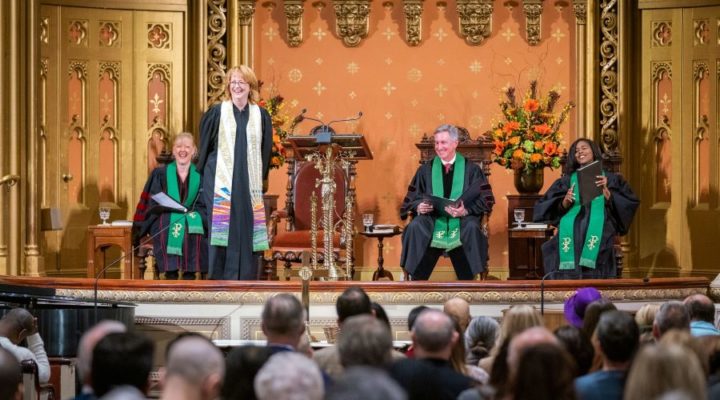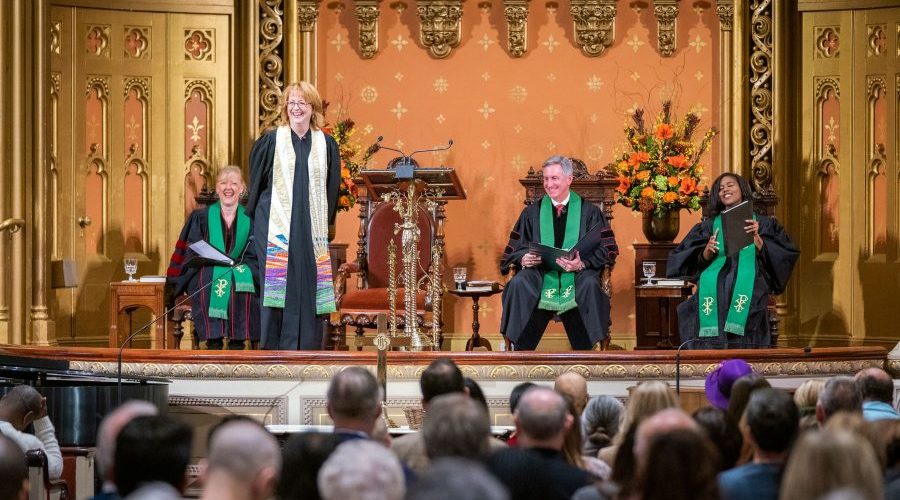Susan Sparks is a preacher and a stand-up comedian, which means she doesn’t have a lot of places to be these days.
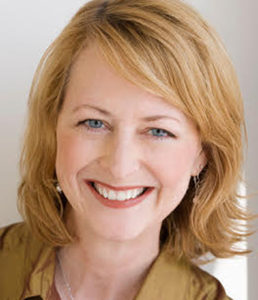
Susan Sparks
Madison Avenue Baptist Church in New York City, where she is senior pastor, isn’t meeting in person. And most comedy venues closed or scaled back during the COVID-19 pandemic.
Pre-recorded sermons and virtual comedy gigs are great, but nowhere near as good as the real thing for her or audiences, she said. “I’m happy to do the sermons and the comedy online, but from the performance standpoint, the energy you get from a live audience cannot be replaced.”
Sparks nevertheless is finding ways to preach the gospel message that she is most passionate about: that faith and humor are entwined and potentially healing in an age of pestilence and socio-political strife.
Last month, she presented a virtual workshop titled “Laughter is Contagious, too!” at the Cooperative Baptist Fellowship’s virtual General Assembly. Her newest book, Miracle on 31st Street, which is a reference to her church, published in April and offers techniques for fostering gratitude.
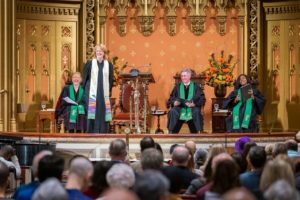
Susan Sparks said she misses the energy of preaching to her congregation.
“Humor is probably the strongest tool we have to generate hope and healing,” she said “They all three interplay.”
Sparks, an author, syndicated columnist and former trial lawyer who grew up Southern Baptist, spoke with Baptist News Global about her calling to share faith and laughter.
How and where are you these days? Are you in New York?
I’m in a beautiful spot in Wisconsin near Lake Superior and about six hours north of Madison. There’s an outhouse. It’s rustic. But it has really powerful wireless, so I’m recording my sermons from here and doing pastoral care on conference calls. It’s classic day-to-day church stuff.
How is your church doing?
We decided to do some reruns for August because our staff is so burned out on this. We are doing prerecorded services, and the editing — nobody gets it until you try to do it. We are going to rerun services to give people a chance to breathe.
How is the congregation doing?
We had five people within our church family come down with COVID-19. They all have recovered, thank God. One was very serious. He went to the hospital but there were no beds, so they gave him an IV and sent him home. This was back in May. But so far, we have only had those five, as far as I know. Which is enough and very scary.
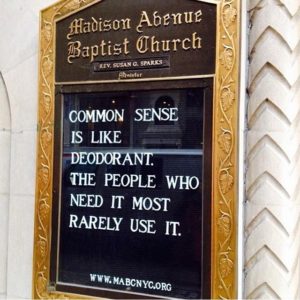
Humor is the norm on the sign at Madison Avenue Baptist Church, where Sparks is senior pastor. (Photo/MABC Facebook)
Our people’s mental state so far is very strong. I have a group of folks who are just scrappy, and they won’t let go of hope. That said, this is really straining that. We have done everything we can to keep that community connection together.
We have live, weekly Zoom calls where we just check in and see how people are doing. I try at least once a month to make sure I contacted every person in the congregation, via text, email and phone calls. But the longer this goes the harder it is.
No partial returns to in-person worship for your church?
None, and especially with the spike that’s going on. Unfortunately, Florida people funnel right into New York, so we have all that going on. And we have a small sanctuary. Max, we can get maybe 250 in there with standing room. Social distancing and singing, it’s a real problem. I think we’re going to start having the conversation this fall, but I don’t see it happening probably until next year. If they want to do it, we can try. But I just don’t see how.
In New York I think churches are looking at the end of the year or into next year before any kind of live services incrementally are started.
“Humor reminds you that you can laugh in a place of pain.”
Your website has a section titled “Hope. Healing. Humor.” Is there any humor to be found in this pandemic or in other struggles?
Humor is a literal lifeboat for folks, a moment where God comes down and lifts the burden up for a split second to give you time to breathe and get enough energy to turn back into the storm.
Even as a cancer survivor, I remember that the ability to laugh in a place of pain was the one thing that empowered me to realize this is not who I am; it was only what I was going through. Humor reminds you that you can laugh in a place of pain — which reminds you that joy is still there and you can heal by accessing it in a really tough spot.
Are churches generally too serious?
Absolutely. I’m pretty sure it was the theologian Elton Trueblood who said it’s not humor that’s the problem, it’s pride. It’s the fact that we think we are in control … and should be perfect and above others and live this life that is full of power and control. But we all have heard the saying, “We plan, God laughs.” I think it does come down to pride.
Is there a spiritual component to humor?
Yes. Humility is such a big piece of humor because you have to be able to laugh at yourself in order to be able to move forward. The point in my first book was if you can laugh at yourself, you can forgive yourself, and if you can forgive yourself, you can forgive others. That ability to laugh at yourself is the doorway to forgiveness.
Is humor something that can be cultivated through practice?
It can be. Research has proved the power and emotional impact of being able to laugh in places of pain. Laughter gives you the ability to see and believe that you can be healed, and that change of perspective goes back and physiologically affects the body.
So yes, you can go out and train yourself. Once you get your mindset on seeing the funny in the world — looking for the glass half full — you’ll be shocked at how much you’ll allow yourself to laugh even when things are challenging.
Do you encounter a lot of skepticism when promoting that process?
Yes, and a lot of it comes down to this question: Do you believe you deserve joy? A lot of people are just going to beat themselves up and are much happier being sad; it’s much safer to them. And if you decide you want to drop that baggage, who are you without that anger? That’s a big awakening to go through, and a lot of people don’t want to put the energy into it.
“I got a laugh-app on my phone. You hit a button, and this massive laughter comes out. Absolutely hilarious.”
Are you and your Muslim and Jewish counterparts on the “Laugh in Peace Comedy Tour” still getting gigs?
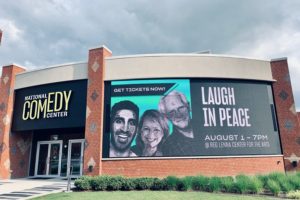
(Photo/The National Comedy Center)
We are doing virtual events. We have a virtual show in a couple of weeks. (Rabbi) Bob (Alper) is doing virtual comedy shows, which I must say are pretty tough when you hit a punchline and there’s nobody there to laugh. I was trying to be funny in a sermon. I hit a punchline and it was prerecorded so there was nobody to laugh. So, I got a laugh-app on my phone. You hit a button, and this massive laughter comes out. Absolutely hilarious. That’s the way we’re doing it right now.
Are you seeing higher traffic on your podcasts and sermons than before the pandemic?
Yes. We’ve got a lot of people coming in on the podcast. Our numbers are way up on the viewing of the services, and readership of the syndicated column I write every two weeks, which runs in 35 states, is definitely strong. The column generates letters, probably two or three a week.
Does it strike you that people are seeking solace anywhere they can find it?
They are. They’re searching. I got a letter from a woman in a teeny town in South Carolina who watched one of my sermons and had shared it with her elderly mother who she takes care of. She sent this lovely handwritten note and a check to the church saying, ‘Thank you’ and, ‘It’s stuff like this that’s keeping us going.’ I know I am not the only one getting letters like this. All these things are a lifesaver for folks. They just need to know they are not alone in this.
What came first when you transitioned from trial lawyer — comedy or ministry?
That sounds like I had a really organized plan. I had been doing comedy while I was a trial lawyer. I started studying comedy when I was practicing in Atlanta. All the good old boys down there were great storytellers … and they were really funny and within seconds jurors trusted them. And I thought, I need to start studying that. So I started studying standup and doing a little performance here and there and realized I loved it.
When did the tug toward ministry come into it?
I felt called when I was little, but the Southern Baptist church was not going to have anything to do with women pastors, so I shut that down about age 7. But it stayed and it stayed and about the 10-year point in my law practice I knew I had to pursue it.
I wasn’t counting on dragging comedy in with it, but there you go. It was like God saying, ‘This isn’t going to be as simple as you thought.’ And it never it is.
Do you feel that humor is an actual part of your calling?
Yes. Definitely. I consider my work a ministry of joy. It’s to remind people that even in the middle of pandemic — in the middle of the worst times of your life, in a chemo chair or losing a loved one — you still have the capacity to feel and choose joy, and the world hasn’t beaten it out of you. I don’t know that I would have seen it that way but for the study of stand-up.
What are people generally more surprised about these days, that you are a pastor and a comedian, or that you are a Baptist and a comedian or woman pastor?
It’s the combination of Baptist preacher and comedian. The fact I am a Baptist pastor and a woman is secondary. That still is a juxtaposition of two completely unrelated ideas that should make people laugh. But it’s the comedian and Baptist because, sadly, the Baptists who have the mic these days are the Baptists who are not at all perceived as funny. They are perceived as hateful and judgmental and corrosive to any type of community.

